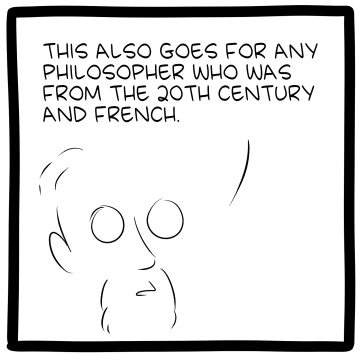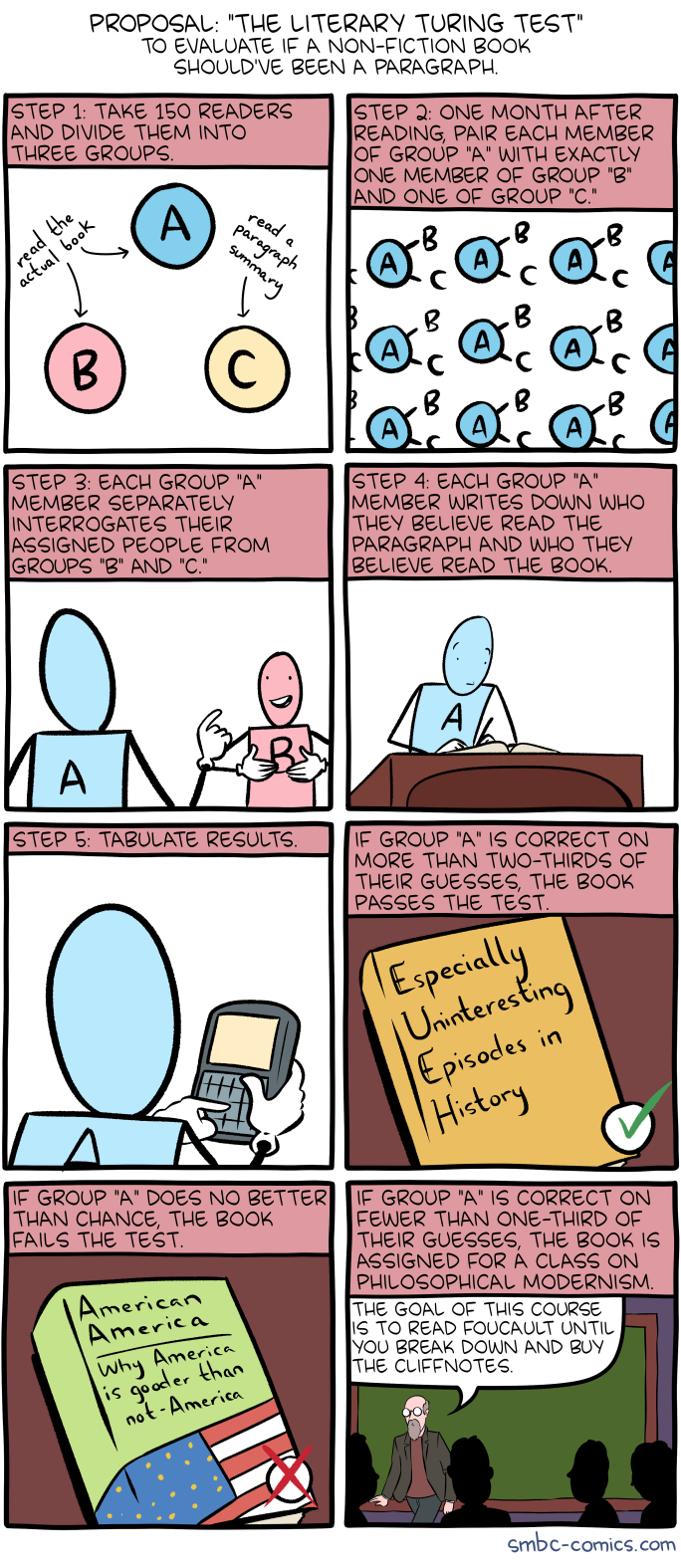November 8, 2018 @ 2:30 pm · Filed by Mark Liberman under Computational linguistics, Psychology of language
« previous post | next post »
Yesterday's SMBC:
The aftercomic:

November 8, 2018 @ 2:30 pm · Filed by Mark Liberman under Computational linguistics, Psychology of language
Powered By WordPress

Philip Taylor said,
November 8, 2018 @ 2:52 pm
I don't even understand the proposal, but for me "evaluate if" would more naturally have been expressed as "decide whether".
Francisco said,
November 8, 2018 @ 3:29 pm
After a full month the single paragraph-readers might actually do better in the test. Or perhaps I'm just getting old and forgetful.
John from Cincinnati said,
November 8, 2018 @ 4:28 pm
I imagine that most Language Log readers who have followed the posts of Geoff Pullum over the years will be convinced that Prof. Pullum has read the full text of "Elements of Style", and not just a paragraph summary. This leads to a Russell's paradox of sorts. By the logic of the SMBC comic, "Elements of Style" is not a book that should have been simply a paragraph, and yet by the logic of Prof. Pullum it is a book that should not have been even one paragraph. Because, you know, omit needless words.
Antonio L. Banderas said,
November 8, 2018 @ 4:40 pm
Which wording is better between "Each group('s) A member"? or even "The A member(s) of each group"?
Jerry Friedman said,
November 8, 2018 @ 6:16 pm
Philip Taylor: "Evaluate" sounds all right to me, but I too would be more comfortable with "whether". I also have some doubts about "pairing" one person with two others.
Antonio Banderas: The trouble with your two suggestions is that there are already groups called A, B, and C, so using "group" for the threesomes involved in the imitation game would confusing. Is it clear that "Each group 'A' member" means "Each member of group 'A'"?
(I might have written "Each group-A member", but I'm like that.)
Doug said,
November 8, 2018 @ 7:59 pm
Philip Taylor said:
"I don't even understand the proposal,"
To simplify & rephrase:
Alice reads the book in question.
Bob reads the book.
Charlie reads a one-paragraph summary of the book.
One month after they do their reading, Alice talks (separately) with Bob and with Charlie.
The question is, can Alice figure out which one (of Bob & Charlie) read the whole book, and which one read the 1-paragraph summary?
You do this with many triads of people.
If the "Alice" member of the triad can usually tell who really read the book, the book passes the test (and deserves to be a legitimate book).
If the Alices are correct only about half the time (i.e., no better than random guessing) the book fails the test and should really have been just a paragraph.
If the Alices guess substantially worse than random chance, see the last panel.\ of the comic.
Bloix said,
November 8, 2018 @ 8:37 pm
I hardly ever finish a full-length book of history or biography. I read long articles in the New Yorker and the NYRB all the time, and I'd be happy to read 2 or 300 hundred pages, but 600, 600, 800 pages – no. Life is too short.
I am in the process of stalling out at around the half-way point in a new bio of Napoleon. I read the whole Grant bio – which i finished because Reconstruction, which was after the half-way point, was so fascinating – and decided that I'd try another biography. Maybe my tastes had changed! No, 300 pages is the usual max for me.
Tim Morris said,
November 8, 2018 @ 10:04 pm
One problem is that, as Pierre Bayard showed in How To Talk About Books You Haven't Read, most people's memory of a read book tends – sometimes over spans less than a month – inevitably toward remembering about a paragraph's worth of summary.
Philip Taylor said,
November 9, 2018 @ 3:16 am
Doug – Thank you very much indeed – I now understand.
ajay said,
November 9, 2018 @ 5:35 am
most people's memory of a read book tends – sometimes over spans less than a month – inevitably toward remembering about a paragraph's worth of summary.
But I bet it's a different paragraph's worth for each person. Which raises a question: does Alice get to see the paragraph summary or not?
艾力·黑膠(Eric) said,
November 12, 2018 @ 2:26 am
Sam Harris on “The Future of the Book”:
Andreas Johansson said,
November 12, 2018 @ 7:46 am
Publishers are now happy to sell e-books of short stories that would be well less than 60pp if printed on paper, so I'm thinking that particular problem may be going away.